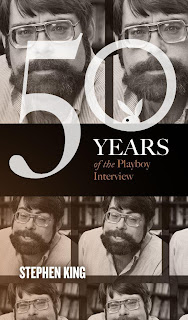Stephen King: The Playboy Interview (50 Years of the Playboy Interview)
Slowly but surely I am making my way through reading the "Playboy interviews" for Kindle. We are talking about 50 years worth of interviews here. But these interviews are gems, historic moments in time with the cult of celebrities and their ghosts. The Stephen King interview was printed in Playboy's June 1984 issue and it's a perfect insight (if you are a fan of Stephen King) into the psyche, motivation and success of a prolific and marketable writer. King's biographic backlog from the June 1984 Playboy interview date is incredibly impressive, with eight movie adaptations (from wikipedia), they are: 1976 - Carrie (based on the novel from 1974). 1980 - The Shining (based on the novel from 1977), 1982 - Creepshow (consists of five short films; one is based on the short story "Weeds" from 1976, one is based on the short story "The Crate" from 1979, and King wrote the rest specifically for the film), 1983 - Cujo (based on the novel from 1981), 1983 - The Dead Zone (based on the novel from 1979), 1983 - Christine (based on the novel from 1983), 1984 - Children of the Corn (based on the short story from 1977), 1984 - Firestarter (based on the novel from 1980).
With an average of four years after completing the mentioned novels, to then transmute earnestly into an adaption for a movie production - showed his rapid proficiency up to that June 1984 interview date. Which, as we all know, has been a constant benchmark with King's writing, with most novels/short stories (in the years to come) in some shape or form being then projected into a movie production and/or television release. What is fascinating about this interview, which was a half way point in King's already rise to fame, is the dated aspects of his lifestyle in that period of the early 1980s. It certainly does seem surreal, reading the interview as through it took place yesterday. There is a lot of ego there and self assured arrogance. Why not? Like I said, he was already famous in the late 1970s, so, it was just more sugar on top. King was reveling in the power of his accomplishments at that time. In that sense this interview is not a pitch, nor a promotion of King (he didn't need it, the Playboy interview was just the next thing, the next expectation - and it happened); it's more of a study, you've got a popular culture figure who had created so many stories, ideas, thoughts, which became our dreams and nightmares (conveyed to us onto the screen) - narrowing it down to Carrie, his first novel, in which he at the time discarded it, then submitted it to the Doubleday Publishing company in New York, from there, at that point his career became what it is today. Or within the context of this interview, from King's 1976 start to his 1984 Playboy expose.
Even if you are not a fan of Stephen King, one cannot ignore the broad appeal that he has been able to create. It would appear to me that he has truly made a deal with the devil (of course I say that in a metaphoric and dialogical sense, with dashes of sarcasm).


Comments
Post a Comment